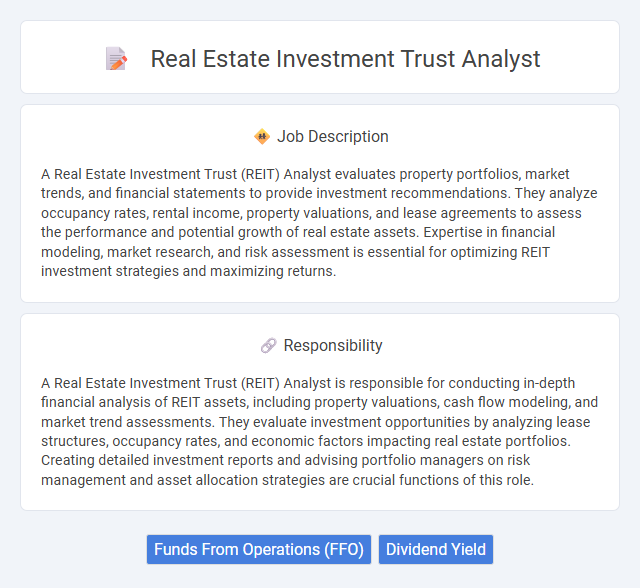
A Real Estate Investment Trust (REIT) Analyst evaluates property portfolios, market trends, and financial statements to provide investment recommendations. They analyze occupancy rates, rental income, property valuations, and lease agreements to assess the performance and potential growth of real estate assets. Expertise in financial modeling, market research, and risk assessment is essential for optimizing REIT investment strategies and maximizing returns.
Individuals with strong analytical skills and an interest in real estate markets are likely suitable for a Real Estate Investment Trust Analyst role. Those who prefer detailed financial modeling and risk assessment may find this job aligns well with their strengths. Candidates who thrive under pressure and can interpret market trends with precision could probably excel in this position.
Qualification
A Real Estate Investment Trust (REIT) Analyst requires a strong foundation in finance, economics, or real estate, often demonstrated through a bachelor's or master's degree in these fields. Proficiency in financial modeling, valuation techniques, and portfolio management is essential, alongside experience with market research and data analysis tools such as Excel, Bloomberg, or ARGUS. Strong analytical skills combined with knowledge of REIT structures, property markets, and regulatory environments enable effective evaluation and recommendation of real estate investment opportunities.
Responsibility
A Real Estate Investment Trust (REIT) Analyst is responsible for conducting in-depth financial analysis of REIT assets, including property valuations, cash flow modeling, and market trend assessments. They evaluate investment opportunities by analyzing lease structures, occupancy rates, and economic factors impacting real estate portfolios. Creating detailed investment reports and advising portfolio managers on risk management and asset allocation strategies are crucial functions of this role.
Benefit
Real Estate Investment Trust (REIT) Analysts likely enjoy the benefit of gaining deep insights into commercial property markets, which can enhance their expertise in real estate valuation and financial modeling. There is a strong probability that their role provides exposure to diverse asset classes and investment strategies, supporting career growth in finance and real estate sectors. Access to comprehensive market data and industry trends may further support informed decision-making and strategic investment recommendations.
Challenge
A Real Estate Investment Trust (REIT) Analyst likely faces challenges in accurately assessing market volatility and forecasting property value trends amid fluctuating economic conditions. The complexity of analyzing diverse real estate portfolios and adapting to regulatory changes may require continuous learning and sophisticated financial modeling skills. Navigating these uncertainties could demand strong analytical abilities and resilience to make informed investment recommendations.
Career Advancement
A Real Estate Investment Trust (REIT) Analyst evaluates property portfolios, market trends, and financial metrics to optimize investment strategies and maximize returns. Mastery in data analysis, financial modeling, and market research drives career advancement toward senior analyst roles, portfolio manager positions, or executive leadership within real estate firms. Expertise in specialized sectors, such as commercial or residential REITs, enhances opportunities for increased responsibility and higher compensation.
Key Terms
Funds From Operations (FFO)
A Real Estate Investment Trust (REIT) Analyst specializes in evaluating Funds From Operations (FFO) to measure a REIT's financial performance and cash flow. FFO, which adjusts net income by excluding depreciation and gains or losses on property sales, provides a clearer picture of a REIT's operating profitability. Accurate analysis of FFO enables investors to assess dividend sustainability and make informed decisions about REIT investments.
Dividend Yield
A Real Estate Investment Trust (REIT) Analyst evaluates property portfolios to determine sustainable dividend yields, critical for attracting income-focused investors. By analyzing rental income, occupancy rates, and property valuations, they forecast cash flows that support consistent dividend distributions. Their expertise ensures accurate assessment of a REIT's ability to maintain or grow dividend yields amidst market fluctuations.
 kuljobs.com
kuljobs.com